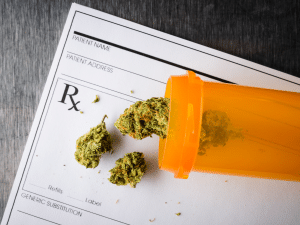Attorney Mary Beth Harrell Explores the Texas Compassionate Use Program for Medical Marijuana
 Mary Beth Harrell, a criminal defense attorney with more than 25 years of experience recently wrote an insightful article on the Texas Compassionate Use Program (CUP) for medical marijuana, which was published in Voice for the Defense. CUP offers important new avenues for those who could benefit from THC-based treatments. As an attorney who often represents those facing marijuana charges in Killeen, Texas, Harrell is able to offer an in-depth analysis regarding this important program.
Mary Beth Harrell, a criminal defense attorney with more than 25 years of experience recently wrote an insightful article on the Texas Compassionate Use Program (CUP) for medical marijuana, which was published in Voice for the Defense. CUP offers important new avenues for those who could benefit from THC-based treatments. As an attorney who often represents those facing marijuana charges in Killeen, Texas, Harrell is able to offer an in-depth analysis regarding this important program.
Why the Texas compassionate use program matters
Under CUP, Texans with certain medical conditions can legally use low-THC cannabis products. For some experiencing chronic conditions, the law offers some relief, although it’s still more restrictive than the policies in many other states.
Harrell covers the law’s usefulness in advocating for clients who are facing marijuana possession charges, in particular, those who could benefit from THC as a treatment.
A few key takeaways
In the article, Harrell discusses a few points that are helpful for other attorneys representing clients facing marijuana challenges, including:
- Ways to help clients arrested for possession of marijuana before enrolling in CUP
- Strategies for seeking leniency, reduced charges or alternative sentencing by showing that the client has a medical need for THC products
- Explanations about who may benefit from CUP, including veterans and those with PTSD, anxiety, and depression
- A discussion on why individuals may prefer THC products over prescription drugs
- Important tips about collecting detailed information on clients medical and mental health when representing those accused of possession
Harrell also covers some additional points about the law, such as that CUP permits low-THC edibles and drops, but does not permit smoking. Additionally, federal regulations prohibit active military members from CUP, but veterans are eligible. It’s also worth noting that CUP can impact a person’s License to Carry, although it won’t necessarily prevent a person from retaining that license.
FAQs
What is the Texas Compassionate Use Program (CUP)?
The Texas Compassionate Use Program (CUP) allows qualified individuals with certain medical and mental health conditions to possess and use low-THC cannabis products. This program provides legal access to medical marijuana for patients who meet specific criteria and are registered with the state.
What conditions qualify for the CUP?
Qualifying conditions include:
- Epilepsy
- Seizure disorders
- Multiple sclerosis
- Spasticity
- Amyotrophic lateral sclerosis
- Autism
- Cancer
- Post-traumatic stress disorder
- Incurable neurodegenerative diseases
Even if your condition is not listed, you may still qualify. It is recommended to consult with a healthcare provider to discuss your specific situation.
Can I use my medical marijuana card from another state in Texas?
No, Texas does not recognize medical marijuana cards from other states. You must obtain a Texas CUP card to legally possess and use medical marijuana in the state.
Can I grow my own marijuana or buy it from a friend if I have a CUP card?
No, patients participating in the CUP must obtain their low-THC products from one of the three licensed dispensaries in Texas. You cannot grow your own marijuana or purchase it from any other source.
Can I carry a handgun with a Texas medical marijuana card?
While a CUP card itself does not disqualify you from obtaining or maintaining a License to Carry (LTC), your underlying medical condition may be a disqualifying factor. The Texas Department of Public Safety may refer your case to the Medical Advisory Board for review.
Can active duty military members participate in the CUP?
No, active duty members of the U.S. Armed Forces are prohibited from participating in the CUP, even if they qualify medically. However, veterans are eligible to participate.
Read the complete article “The Texas Compassionate Use Program for Medical Marijuana” to learn more about CUP and how attorneys can use the program to support clients. Mary Beth Harrell has offices in Killeen and Copperas Cove and represents clients in Texas and federal courts. If you need experienced legal representation, contact us to schedule a consultation.

I’ve dedicated my legal career to defending my clients. I demand all the evidence. I investigate all the facts, the so-called witnesses and even the police officers. I make it my business to know the law. Cases can be won or lost before you even set foot inside the courtroom.
Read more about Mary Beth Harrell
